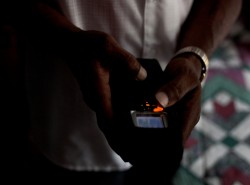How to Improve the State’s GPS Tracking System
GPS breakdowns when tracking ex-offenders waste taxpayers’ money and undermine rehabilitation efforts. But there are possible solutions.
LOSING TRACK
About this project: Thirteen offenders told the Wisconsin Center for Investigative Journalism that Wisconsin’s GPS tracking system repeatedly fails, registering false alerts and landing the offenders in jail although they had done nothing wrong. Meanwhile, Gov. Scott Walker is proposing an expansion of nearly 50 percent in the number of offenders monitored by GPS devices.
Offenders and their advocates say that GPS breakdowns waste taxpayers’ money with unnecessary police work and lockups, and hamper offenders’ efforts to restore relationships with their families and retain jobs. The DOC says the system is reliable, but releases few details and acknowledges its performance hasn’t been audited. A key GOP legislator says an audit may be in order.
DAY 1: State’s Sex Offender Tracking System Often Fails
DAY 2: How to Improve the State’s GPS Tracking System
The problem of the state’s GPS tracking system for ex-offenders is illustrated by the case of Aaron Hicks. From January 2011 to November 2012, Hicks was arrested at least 12 times for parole violations related to his GPS monitor, spending 74 days in jail, records show. Among these occasions:
- On April 9, 2011, Hicks lost his GPS signal for 17 minutes. As a result, he was arrested and spent three days in Dane County Jail. Hicks indicated in a written statement that he was out apartment searching and did not receive any messages or hear his tracker beep regarding a lost signal.
- On Oct. 7, 2011, Hicks lost his GPS signal after leaving a barbershop in Madison. A warrant was issued for his arrest and he was taken into custody; he spent three days in jail. His parole agent later explained that sometimes tall buildings and proximity to lakes make obtaining a GPS signal more difficult.
- On June 12, 2012, Hicks was arrested for being out of tracker range during a two-hour period. Hicks wrote that he placed his tracker on the kitchen table while he watched a basketball game in an adjoining room, which he had done before without triggering alerts. He refused to admit to any violations, and was jailed for 51 days — until after he signed a statement agreeing he had failed to comply with the rules.
- On Aug. 16, 2012, at 5:03 a.m., Hicks’ GPS equipment registered a “strap tamper alert,” raised when an offender is suspected of removing his equipment. Police took him into custody. Hicks said he was at home sleeping and did not remember any problems with the device. He spent one day in jail.
Advocates for released prisoners say that GPS breakdowns waste taxpayers’ money with unnecessary police work and lockups, and they hamper offenders’ efforts to restore relationships with their families and retain jobs.

On July 31, 2012, James Morgan stands in his Madison bedroom with a Wisconsin Center for Investigative Journalism photographer. On several occasions, his GPS monitor begins flashing, indicating he is out of range, even though Morgan is well within boundaries determined by his parole agent. The Center spoke with 13 offenders who said such issues as lost signals are landing them in jail repeatedly. Lukas Keapproth/Wisconsin Center for Investigative Journalism
How can Wisconsin’s electronic monitoring using GPS devices be made more reliable and effective? Here are some suggestions drawn from interviews with experts:
Problem: The Wisconsin Department of Corrections does not keep statistics on how many GPS offenders trigger alerts, and does not track how often these result in offenders being incarcerated.
Solution: George Drake, a corrections technology consultant, said agencies that implement GPS tracking should have clearly stated objectives for using the technology and should conduct audits on a biannual or yearly basis.
Problem: GPS monitoring may have little long-term effect on recidivism or behavioral change.
Solution: Robert Gable, who helped design the first electronic monitoring system used to track offenders, said it can be used to promote positive behavioral change by offering “modest incentives” to offenders who follow the rules.
Problem: Probation and parole agents have insufficient time and resources to meet the demands of supervising caseloads of GPS clients.
Solution: A 2012 evaluation of the California supervision program recommended smaller or specialized caseloads for GPS-tracked offenders and better risk-assessment to identify appropriate GPS candidates.
The nonprofit Wisconsin Center for Investigative Journalism (www.WisconsinWatch.org) collaborates with Wisconsin Public Radio, Wisconsin Public Television, other news media and the UW-Madison School of Journalism and Mass Communication. This story was a produced in collaboration with Wisconsin Public Television.
All works created, published, posted or disseminated by the Center do not necessarily reflect the views or opinions of UW-Madison or any of its affiliates.
Losing Track
-
GPS Monitoring Inventor Says it’s Misused
 Mar 13th, 2018 by Riley Vetterkind
Mar 13th, 2018 by Riley Vetterkind
-
Many On GPS Monitoring Are Homeless
 Mar 10th, 2018 by Riley Vetterkind
Mar 10th, 2018 by Riley Vetterkind
-
Does GPS Monitoring Violate Civil Rights?
 Mar 8th, 2018 by Riley Vetterkind
Mar 8th, 2018 by Riley Vetterkind




















